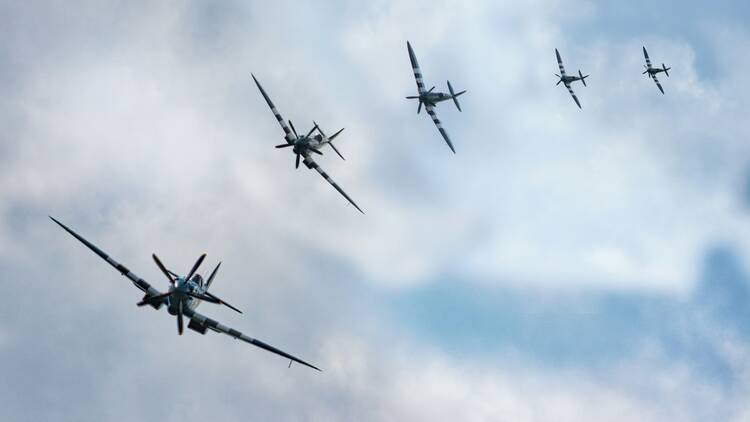What an American veteran remembered about the war after a chance encounter with a Palestinian

One day, while sitting outside a Starbucks with my wife, I got talking to two brothers who, it turned out, were Palestinians from Gaza, one with his six-year-old son. “I’m so sorry about what’s happening there,” I said. “Do you still have family there? Are they OK?”
“My family is there,” said one of the men. “Most of them are dead now.”
He waved his phone and showed a video of his cousin, an American citizen. “He went home for a few months to be with my family in Gaza,” he said. “Then the war broke out in October and he was stuck.”
The video shows a desperate young man whose apartment was rocked by explosions. He screamed: “Get us out of here. My children are in danger! We have to stop this. Stop this violence. Bombs everywhere!”
“He died,” said my new acquaintance. “He was killed by bombs. The American embassy was no help at all. And so were his three children. All of them are dead.”
Then he showed us photos of his cousin’s three children, one of them a baby. They had obviously died of concussions. Bodies with blind eyes lay next to each other. All of them were dead.
We couldn’t say anything more and were all silent for a while.
He offered to buy us a second cup of coffee. I declined, wished him well, and he left our lives as abruptly as he had entered.
Here was a man searching for hope in the depths of despair. Our conversation made me reflect on my own experiences with war and violence, however distant they may have been.
During the Cold War, I was an artillery officer with the 101st Air Assault Division. During my entire summer training learning to fire at Fort Sill, Oklahoma, and during the four years I spent with an artillery battalion at Fort Campbell, Kentucky, not once did we talk about what our shells did to real people. We fired phosphorus shells in training, but we never saw them produce such horrific results as inextinguishable, burning flesh on impact. Nor did we see the effects of explosives causing death by concussion, as with the little Palestinian children in the photograph I had just seen.
No, we practiced giving orders to fire at targets. We fired artillery shells and aimed them at old tanks in a field. We never imagined the effect these shells would have on people. From our vantage point, the tanks were just tiny dots on the horizon.
I remember a discussion I had with a pilot. He mentioned how he would “lay” his bombs over a “target” and return to the officers’ club for dinner that evening. Artillery fire or bombings on distant targets desensitize us to the brutal effects of war. This allows our wars to go on year after year, century after century. Perhaps having our hands in blood and seeing the slaughtered mother or child will make us think.
Once, while visiting Marburg in 1976, I came across a narrow cemetery. I went in and noticed that almost all the graves had the same date engraved on them: the day the city was bombed. Among the graves of dead civilians was that of an 84-year-old grandmother. She had the same name as a friend from my neighborhood in Missouri. On this strange occasion, I felt a completely unexpected sense of loss. Here, a World War II bombing victim became a real person.
Later, I read about the horror that French writer Gabriel Chevallier had to endure in the trenches of World War I. He saw the same corpses blown up again and again.
During the massacre that Chevallier witnessed during the Somme offensive in the “war to end all wars,” trains full of shells were delivered to the front every day. Even in the 21st century, we continue to use seemingly endless amounts of ammunition in wars. A century after the First World War, we have still not achieved lasting world peace. The inhabitants of Gaza, who do not even have the protection of trenches, are subjected to such attacks again and again every day, until only rubble remains to cover the dead.
As I said goodbye to the Palestinian, we said we would pray for each other. I would pray that he would find the courage and hope he is looking for. My fear is that his six-year-old nephew will grow up without courage and hope and will see in the people of Israel only enemies who will hurt his family, enemies who must be killed.
Wars are always going on. The further we are from their effects, the more brutally we behave. Brief depictions of war on television are accompanied by a warning to the viewer. When a soldier fires at artillery or drops bombs, what he or she actually sees on the images from a drone is an explosion of smoke and flames.
We veterans, seeing the dead, the maimed and the slaughtered, can be oracles of honesty. We can tell our neighbors, our families and our representatives that war is not an adventure. We must try everything instead of going to war. A child dying of a concussion brings no honor, solves nothing, and even fuels revenge. We may be treated like Cassandra and ignored. But when we veterans know the true cost of war, we must act. Knowing that with memory comes obligation, we must tell the truth.



